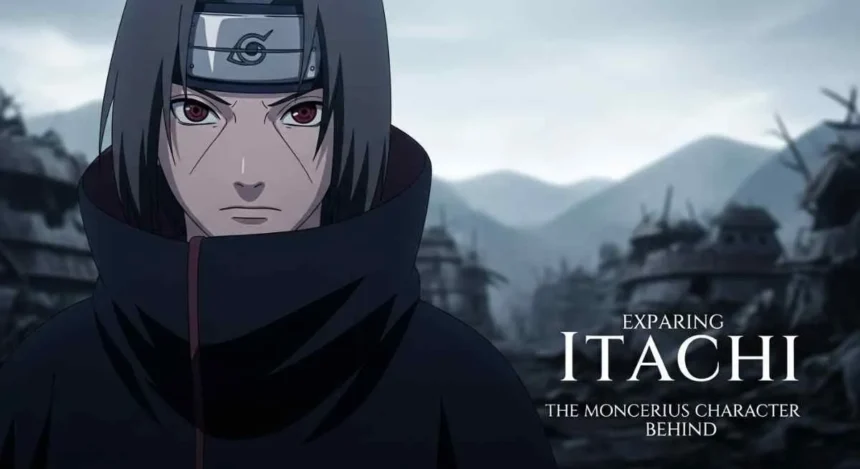The crimson glow of the Mangekyō Sharingan pierces through the darkness as Itachi Uchiha stands over the bodies of his fallen clan members, his face a mask of cold determination hiding the torment within. This haunting image represents one of anime’s most controversial and complex characters—a man who sacrificed everything, including his own moral standing, in pursuit of a greater peace.
Itachi Uchiha remains one of the most psychologically intricate characters in the Naruto universe, embodying the paradox of a monster who commits unspeakable acts in service of love and peace. This comprehensive analysis explores his transformation from prodigy to pariah, examining the political machinations, personal sacrifices, and philosophical struggles that define his tragic legacy.
Readers will discover the truth behind the Uchiha clan massacre, understand Itachi’s philosophy on peace, and explore whether his actions represent the ultimate sacrifice or an unforgivable betrayal. We’ll delve into the complex politics of Konoha, the influence of Shisui Uchiha, and the psychological framework that drove one of the most pivotal decisions in shinobi history.
The Rise of Itachi Uchiha
Early Prodigy and Clan Expectations
Itachi Uchiha entered the world during a time of relative peace, born into the prestigious Uchiha clan with expectations that would shape his entire existence. From childhood, Itachi displayed extraordinary talent that set him apart from his peers and even adult shinobi. His intellectual capacity, combined with natural combat abilities, marked him as a once-in-a-generation prodigy.
The young Uchiha demonstrated remarkable empathy and philosophical depth unusual for someone his age. Unlike many of his clan members who focused solely on strength and pride, Itachi questioned the nature of conflict and sought to understand the broader implications of shinobi warfare. This introspective nature would later prove crucial in shaping his worldview and ultimate decisions.
Growing up in the aftermath of the Third Shinobi World War, Itachi witnessed firsthand the devastating consequences of large-scale conflict. The traumatic experience of seeing fallen comrades and the senseless violence of war deeply affected his psychological development, instilling in him a profound desire to prevent future conflicts at any cost.
The Influence of Shisui Uchiha
Shisui Uchiha served as more than just a mentor to young Itachi—he became a philosophical guide and moral compass. Shisui’s unique perspective on peace and his ability to see beyond clan politics profoundly influenced Itachi’s developing worldview. Their relationship represented the bridge between traditional Uchiha values and a more progressive understanding of shinobi duty.
Shisui’s tragic death and the circumstances surrounding it marked a turning point in Itachi’s psychological development. The loss of his closest friend and mentor, combined with the political implications of Shisui’s demise, forced Itachi to confront the harsh realities of clan politics and village loyalty. This traumatic event triggered the awakening of his Mangekyō Sharingan and set him on the path toward his ultimate destiny.
The philosophical discussions between Shisui and Itachi about the nature of peace, the role of sacrifice in achieving harmony, and the sometimes necessary evil of difficult choices laid the groundwork for Itachi’s later actions. Shisui’s belief that sometimes one must dirty their hands to achieve a greater good became a central tenet of Itachi’s operating philosophy.
Awakening the Mangekyō Sharingan
The awakening of Itachi’s Mangekyō Sharingan following Shisui’s death represented both his greatest power and his ultimate burden. This advanced form of the Sharingan granted him incredible abilities but came at the cost of his eyesight and his emotional well-being. The psychological trauma required to awaken such power left lasting scars on his psyche.
The abilities granted by his Mangekyō Sharingan—Tsukuyomi, Amaterasu, and later Susanoo—made him one of the most formidable shinobi of his generation. However, these powers also isolated him further from his peers and family, as the burden of such strength came with equally heavy responsibilities and expectations.
The Uchiha Clan Massacre Explained

Political Tensions in Konoha
The relationship between the Uchiha clan and the village of Konoha was built on a foundation of mutual distrust and historical grievances. The ancient rivalry between Senju vs. Uchiha clans had never truly been resolved, merely suppressed under the surface of village unity. This underlying tension created fertile ground for the political crisis that would ultimately lead to tragedy.
Following the Nine-Tails attack on Konoha, suspicion fell heavily on the Uchiha clan due to their unique ability to control tailed beasts through the Sharingan. The village leadership’s decision to relocate the Uchiha to the outskirts of the village sent a clear message of distrust that further inflamed existing tensions and pushed moderate clan members toward more radical positions.
The politics of Konoha’s Uchiha clan reflected broader themes of discrimination, isolation, and the dangerous consequences of treating a population as inherently suspicious. The village’s failure to address legitimate Uchiha grievances through diplomatic means created an environment where extremist solutions became increasingly attractive to desperate clan members.
Danzo Shimura’s Machinations
Danzo Shimura’s role in the Uchiha crisis cannot be understated. His manipulation of events, from the theft of Shisui’s eye to his refusal to consider peaceful alternatives, represents the darkest aspects of political pragmatism taken to its logical extreme. Danzo’s belief that the Uchiha posed an existential threat to Konoha justified, in his mind, any action necessary to eliminate that threat.
The shadowy leader of Root orchestrated a masterful campaign of manipulation, using fear and suspicion to corner both the Uchiha clan and the village leadership into positions where violence seemed inevitable. His exploitation of Itachi’s loyalty to the village and love for his brother created the perfect conditions for his preferred solution: the complete elimination of the Uchiha threat.
Danzo’s ability to present the massacre as the only viable option reflects his understanding of human psychology and political necessity. By framing the choice as either a coup that would destroy the village or a preemptive strike that would preserve peace, he successfully manipulated one of the village’s most capable shinobi into becoming his unwitting executioner.
Why Did Itachi Massacre the Uchiha Clan?
Why did Itachi massacre the Uchiha clan remains one of the most complex moral questions in the Naruto universe. The decision was born from an impossible choice between family loyalty and village security, between personal bonds and the greater good. Itachi’s actions must be understood within the context of the political crisis that made violence seem inevitable.
The impending Uchiha clan massacre was presented to Itachi as a fait accompli—it would happen with or without his participation. His choice was not whether the clan would die, but whether their deaths would serve a purpose and whether his brother could be spared. This framing transformed Itachi from an aggressor into a reluctant participant trying to minimize damage within an already determined outcome.
Itachi’s psychological state during this period reveals a young man torn between competing loyalties and moral frameworks. His decision to participate in the massacre while protecting Sasuke represents an attempt to honor both his duty to the village and his love for his family, even though such a compromise required him to become the very monster he sought to prevent others from becoming.
The philosophical weight of choosing between the lives of seventy clan members and potentially thousands of village civilians created an impossible moral calculus. Itachi’s decision reflects utilitarian thinking taken to its extreme—the greatest good for the greatest number, even when that requires unthinkable personal sacrifice.
Itachi’s Philosophy on Peace

The Burden of Understanding
Itachi’s philosophy on peace emerged from his unique position as someone who understood both the costs of conflict and the terrible prices sometimes required to prevent it. His early exposure to war’s devastation, combined with his intellectual capacity for strategic thinking, created a worldview where peace was not merely the absence of conflict but the active prevention of greater violence.
His philosophical framework incorporated elements of consequentialist ethics, where actions are judged by their outcomes rather than their inherent morality. This perspective allowed him to justify participating in the massacre as a means of preventing a civil war that would have claimed far more lives and potentially destroyed the village entirely.
The tragedy of Itachi’s philosophy lies in its isolation—he alone bore the burden of this knowledge and the responsibility for its implementation. His decision to shoulder the moral weight of the massacre without sharing the truth reflects his understanding that some burdens cannot be distributed without destroying their effectiveness.
Sacrifice and Redemption
The concept of sacrifice permeates every aspect of Itachi’s character development and decision-making process. His willingness to sacrifice his reputation, his relationships, his health, and ultimately his life for the sake of peace represents either the highest form of selflessness or the most tragic form of self-destruction, depending on one’s perspective.
Itachi’s philosophy on peace required him to become the villain in his brother’s story, ensuring that Sasuke would have both the motivation to grow stronger and a clear target for his hatred. This psychological manipulation, while effective in achieving its goals, reveals the disturbing lengths to which Itachi was willing to go to orchestrate his vision of a peaceful future.
The redemptive aspects of his philosophy emerged in his final confrontation with Sasuke, where he revealed the truth behind his actions and sought to free his brother from the cycle of hatred that had consumed the Uchiha clan. His death represented both the culmination of his sacrificial philosophy and his final gift to Sasuke—the freedom to choose his own path.
Psychological Analysis of Itachi Uchiha
The psychological analysis of Itachi Uchiha reveals a complex individual shaped by trauma, genius-level intelligence, and impossible moral burdens. His psychological profile shows characteristics of both exceptional emotional intelligence and severe compartmentalization—the ability to separate his actions from their emotional impact on himself.
Itachi’s capacity for long-term strategic thinking allowed him to construct elaborate plans spanning years or decades, but this same ability trapped him in psychological frameworks where immediate suffering was justified by distant benefits. His willingness to endure psychological torture through techniques like Tsukuyomi on his own brother demonstrates both his commitment to his goals and the extent of his self-punishment.
The development of his terminal illness can be understood not just as a physical consequence of Mangekyō Sharingan overuse, but as a psychosomatic response to the psychological stress of maintaining his cover story while watching his brother’s hatred grow. His body’s deterioration paralleled his mental state as the weight of his secrets took an increasingly heavy toll.
His final psychological state showed signs of both relief and regret—relief at finally being able to reveal the truth to Sasuke, but regret over the methods he had used and the pain he had caused. This complexity makes him one of the most psychologically realistic characters in the series despite the fantastical setting.
Redemption and Legacy

The Itachi Uchiha Redemption Story
The Itachi Uchiha redemption story unfolds not through a change in his character, but through the gradual revelation of his true motivations and the costs he paid for his choices. Unlike traditional redemption arcs where characters recognize their mistakes and change course, Itachi’s redemption comes through understanding—both his own understanding of his limitations and others’ understanding of his sacrifices.
His resurrection through Edo Tensei provided the opportunity for a more complete redemption, allowing him to work alongside his brother and demonstrate the person he might have been under different circumstances. This second chance revealed that beneath the cold exterior lay someone capable of warmth, humor, and genuine affection—qualities that his role as the clan traitor had forced him to suppress.
The redemptive elements of his character are complicated by the questionable nature of some of his methods. While his ultimate goals were noble, his willingness to psychologically torment his brother and manipulate events from the shadows raises ethical questions about whether good intentions can justify harmful means.
Impact on Naruto Characters
Itachi’s influence on other Naruto characters extends far beyond his direct interactions with them. His philosophy of sacrifice for the greater good influenced Naruto’s understanding of what it means to be Hokage, while his relationship with Sasuke shaped one of the series’ central character arcs.
The revelation of Itachi’s true loyalties forced many characters to reconsider their assumptions about morality, loyalty, and the nature of sacrifice. Akatsuki member Itachi served as a double agent whose true allegiances remained hidden until after his death, demonstrating the complex moral landscape that defines the shinobi world.
His impact on village politics and the relationship between different clans in Konoha created lasting changes in how the village approached internal security and minority relations. The tragedy of the Uchiha served as a cautionary tale about the dangers of allowing fear and suspicion to drive policy dec




